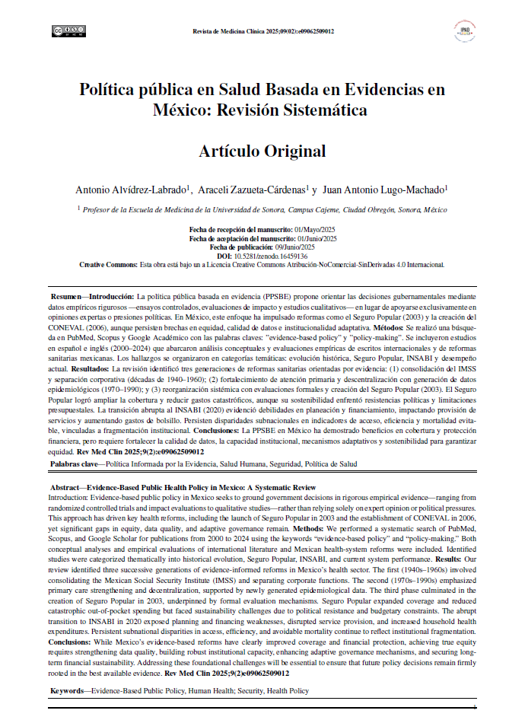Resumen
Introducción: La política pública basada en evidencia (PPSBE) propone orientar las decisiones gubernamentales mediante datos empíricos rigurosos. Métodos: Se realizó una búsqueda en PubMed, Scopus y Google Académico con las palabras claves: ''evidence-based policy'' y ''policy-making''. Se incluyeron estudios en español e inglés (2000–2024) que abarcaron análisis conceptuales y evaluaciones empíricas de escritos internacionales y de reformas sanitarias mexicanas. Los hallazgos se organizaron en categorías temáticas: evolución histórica, Seguro Popular, INSABI y desempeño actual. Resultados: La revisión identificó tres generaciones de reformas sanitarias orientadas por evidencia: (1) consolidación del IMSS y separación corporativa (décadas de 1940–1960); (2) fortalecimiento de atención primaria y descentralización con generación de datos epidemiológicos (1970–1990); y (3) reorganización sistémica con evaluaciones formales y creación del Seguro Popular (2003). El Seguro Popular logró ampliar la cobertura y reducir gastos catastróficos, aunque su sostenibilidad enfrentó resistencias políticas y limitaciones presupuestales. La transición abrupta al INSABI (2020) evidenció debilidades en planeación y financiamiento, impactando provisión de servicios y aumentando gastos de bolsillo. Persisten disparidades subnacionales en indicadores de acceso, eficiencia y mortalidad evitable, vinculadas a fragmentación institucional. Conclusiones: La PPSBE en México ha demostrado beneficios en cobertura y protección financiera, pero requiere fortalecer la calidad de datos, la capacidad institucional, mecanismos adaptativos y sostenibilidad para garantizar equidad.
Referencias
Grayson L. Using evidence: How research can inform public services: a review. Evidence and Policy. 2007;3(3).
Head BW. Reconsidering evidence-based policy: Key issues and challenges. Vol. 29, Policy and Society. 2010.
Pawson R, Tilley N. Realistic evaluation / Ray Pawson and Nick Tilley. American Journal of Evaluation. 2001;22(3).
KABOUB F. Realistic EvaluationRay Pawson and Nick Tilley, Sage, London, 1997, 256 pages. Soc Sci J. 2004;41(1).
Orenstein WA, Cairns L, Hinman A, Nkowane B, Olivé JM, Reingold AL. Measles and Rubella Global Strategic Plan 2012–2020 midterm review report: Background and summary. Vaccine. 2018;36.
Banerjee A V., Lustig N, Rogoff K. An Evaluation of World Bank Research, 1998 - 2005. SSRN Electronic Journal. 2017;
Alcaraz C, Chiquiar D, Orraca MJ, Salcedo A. The Effect of Publicly Provided Health Insurance on Academic Performance in Mexico. The Effect of Publicly Provided Health Insurance on Academic Performance in Mexico. 2012.
Frenk J, Sepúlveda J, Gómez-Dantés O, Knaul F. Evidence-based health policy: Three generations of reform in Mexico. Lancet. 2003;362(9396).
Delaney JS, Al-Kashmiri A, Drummond R, Correa JA. The effect of protective headgear on head injuries and concussions in adolescent football (soccer) players. Br J Sports Med. 2008;42(2).
Dobrow MJ, Goel V, Upshur REG. Evidence-based health policy: Context and utilisation. Soc Sci Med. 2004;58(1).
Murray C, Frenk J. World Health Report 2000: A step towards evidence-based health policy. Lancet. 2001;357(9269).
Oxman AD, Bjørndal A, Becerra-Posada F, Gibson M, Block MAG, Haines A, et al. A framework for mandatory impact evaluation to ensure well informed public policy decisions. Vol. 375, The Lancet. 2010.
Gutierrez JP, Castañeda A, Agudelo-Botero M, Martínez-Valle A, Knight M, Lozano R. Performance evaluation of Mexico’s health system at the national and subnational level, 1990–2019: an analysis of the Health Access and Quality Index. Public Health. 2024 Nov 1;236:7–14.
Knaul FM, Arreola-Ornelas H, Méndez-Carniado O, Bryson-Cahn C, Barofsky J, Maguire R, et al. Las evidencias benefician al sistema de salud: Reforma para remediar el gasto catastrófico y empobrecedor en salud en México. Salud Publica Mex. 2007;49(SUPPL. 1).
Hawkins B, Parkhurst J. The “good governance” of evidence in health policy. Evidence and Policy. 2016;12(4).
Baron J. A Brief History of Evidence-Based Policy. Annals of the American Academy of Political and Social Science. 2018;678(1).
Knaul FM, Arreola-Ornelas H, Touchton M, McDonald T, Blofield M, Avila Burgos L, et al. Setbacks in the quest for universal health coverage in Mexico: polarised politics, policy upheaval, and pandemic disruption. Vol. 402, The Lancet. 2023.
Baethge C, Goldbeck-Wood S, Mertens S. SANRA—a scale for the quality assessment of narrative review articles. Res Integr Peer Rev. 2019;4(1).
Vandenbroucke JP, Von Elm E, Altman DG, Gøtzsche PC, Mulrow CD, Pocock SJ, et al. Strengthening the Reporting of Observational Studies in Epidemiology (STROBE): Explanation and elaboration. PLoS Med. 2007;4(10).
Wells G, Shea B, O’Connell D, Peterson J. Ottawa, ON: Ottawa Hospital Research Institute. 2000. The Newcastle-Ottawa Scale (NOS) for assessing the quality of nonrandomised studies in meta-analyses.
Sturm R. Evidence-based health policy versus evidence-based medicine. Vol. 53, Psychiatric services (Washington, D.C.). 2002.
Thomson R, Murtagh M, Khaw FM. Tensions in public health policy: Patient engagement, evidence-based public health and health inequalities. Vol. 14, Quality and Safety in Health Care. 2005. p. 398–400.
Van Egmond S, Bekker M, Bal R, Van Der Grinten T. Connecting evidence and policy: Bringing researchers and policy makers together for effective evidence-based health policy in the Netherlands: A case study. Evidence and Policy. 2011;7(1).
Malterud K, Bjelland AK, Elvbakken KT. Evidence-based medicine - an appropriate tool for evidence-based health policy? A case study from Norway. Health Res Policy Syst. 2016;14(1).

Esta obra está bajo una licencia internacional Creative Commons Atribución-NoComercial-SinDerivadas 4.0.
Derechos de autor 2025 Antonio Alvídrez-Labrado, Araceli Zazueta-Cárdenas, Juan Antonio Lugo-Machado

